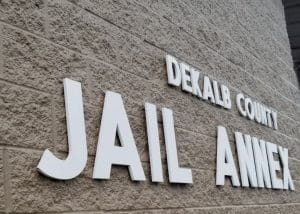December 31, 2024
By: Dwayne Page
The county took on several major issues in 2024 including plans for construction of a new elementary school and implementation of the county powers act to regulate undesirable land uses but none was as controversial as whether to build a new jail or judicial center.
For months the county commission met with an architect and construction company and others on plans and costs for construction of a new facility to satisfy requirements of the Tennessee Corrections Institute. Since 2019, the county has been under a plan of action with TCI to make measurable progress toward remedying jail deficiencies with some type of building program. In August 2023, TCI reduced the number of certifiable beds in the DeKalb County Jail from 102 to 52. Sheriff Patrick Ray has since been housing inmates in other jails which has become costly to the county and ran overbudget this year 2024-25.
With talk of building a new jail, came a discussion about lack of security and space at the courthouse, which led to planning for a new judicial center to house all the court related facilities, sheriff’s department, and jail in one complex. And although properties were considered for such a facility, including at the existing jail location downtown, still none has been selected.
The commission was divided on what to build, either a judicial center or jail, but in June with adoption of the new budget for the 2024-25 fiscal year, a 51 cent property tax increase was approved for debt service to fund the costs of building a new 190 bed jail/judicial center along with an initial bond resolution authorizing the county to borrow up to $65 million for the project. The vote was 7 to 7 on both the tax increase and the bond resolution but County Mayor Matt Adcock, as Chairman of the Commission, cast the tiebreaking vote in each case. In addition, the commission called for a public referendum to be held in the November election for a $50 wheel tax which would have also been used for the judicial center project. Funds from the wheel tax would have offset somewhat, the property tax hike and perhaps brought the 51 cents down to a lower level in the future.
A provision in the bond resolution gave the public an opportunity to petition against the issuance of bonds and call for a referendum and that’s what occurred in the weeks that followed. A successful petition drive was organized under the name DeKalb Citizens for Responsible Taxation forcing a public referendum.
In the November election, DeKalb County voters soundly defeated both referendums regarding the proposed $50 wheel tax and the issuance of general obligation bonds not to exceed $65 million for a judicial center/jail.
In December, the Tennessee Corrections Institute Board of Control met in Nashville and voted to continue certification of the DeKalb County Jail for 52 male inmates another year under a plan of action upon the recommendation of TCI Deputy Director Bob Bass. Two days after the referendum vote in November, the county commission’s jail committee met with Bass who warned them that if they did not commit to building a jail, he would not recommend to the TCI Board continued certification of the jail under a plan of action. The commission, at that jail committee meeting, voted unanimously to pursue only the jail model.
Bass, who is soon retiring from his position as TCI Deputy Director, will remain as a consultant and he plans to meet with the jail committee again on January 6 to give advice on the next step in this process.
While the county is still struggling with the jail issue, it has charted a path forward toward construction of a new 800 student elementary school without raising property taxes again if it can secure agreements with the four municipalities in the county to extend their existing local option sales tax agreements with the county by 18 years through the year 2055. Three of the four cities have already agreed to do that along with the Board of Education, but Alexandria is the lone holdout. Smithville’s agreement was made conditional upon the county issuing bonds for a new school within one year. During the December meeting, the county commission voted to extend the January 1, 2025 deadline until February 1, 2025 to give Alexandria city leaders more time to act.
Under the sales tax agreements with the county, which are set to expire in 13 years on July 16, 2037, the cities turn over to the county for schools a greater percentage of their local option sales tax collections than they would otherwise be required to do. That money goes into what is called the Local Purpose Tax Fund for Schools to help fund school operation and debt. Officials say the county must be able to count on that extra sales tax money coming in from the cities over the life of the 30-year bond up to $55 million to build a new school in order to cover the costs without having to use or raise property taxes to fund it. Earlier in the year, the county commission had asked the Board of Education to contribute $2 million of its reserves to help fund construction of a new school but the board rejected the request.
Meanwhile, in September, the county commission authorized a study by the planning commission toward possible eventual county-wide zoning and followed that up with passage of the county powers act in October after neighbors in the Snow Hill Community discovered in late July that a quarry, Smyrna Ready Mix had started blasting on Driver Road. Later, residents in the Liberty/Alexandria area learned that another quarry operation was planned by Jones Brothers on Old Highway 53 at Liberty and then came word that McMinnville Energy LLC was putting in a cryptocurrency mining operation on South College Street just outside the Smithville City Limits.
In November due to perceived inaction of county powers act enforcement, residents who live near the quarry locations, showed up at a county commission workshop meeting to question why the county had not done more.
In December the commission voted to have County Attorney Hilton Conger send all three companies a letter with an application as per the county powers act. On the application the companies may request an exemption and explain why they should be grandfathered. It would then be up to the county whether or not to grant the request.
Under the regulatory resolution, which was approved by the county commission on October 28 “No quarry, rock crusher or gravel pit, cryptocurrency mine, landfill, adult entertainment, or methadone clinic may be located within 5,000 feet of a residence, school, licensed daycare facility, park, recreation center, church, retail, commercial, professional, or industrial establishment. Measurements shall be taken from the nearest recorded property line of the business to the nearest property line or boundary of the foregoing”. The effective date of the regulations was October 28, 2024. However, according to the grandfather clause of the resolution the distance requirements shall not apply to quarries, rock crushers or gravel pits, cryptocurrency mine, landfill, adult entertainment or methadone clinics “in existence and in operation” on October 28, 2024.
Residents opposed to the quarries and cryptocurrency mine said Jones Brothers and McMinnville Energy were not in operation when the county powers act resolution was adopted on October 28 and are still not in operation now. They also claim that SRM had not applied for their TDOT permit prior to passage of the county powers act and that they had operated for a few days illegally without any Tennessee state permit resulting in the state subsequently stopping them from operating. According to the residents, this happened again recently, and they (SRM) were told to remove all equipment.





